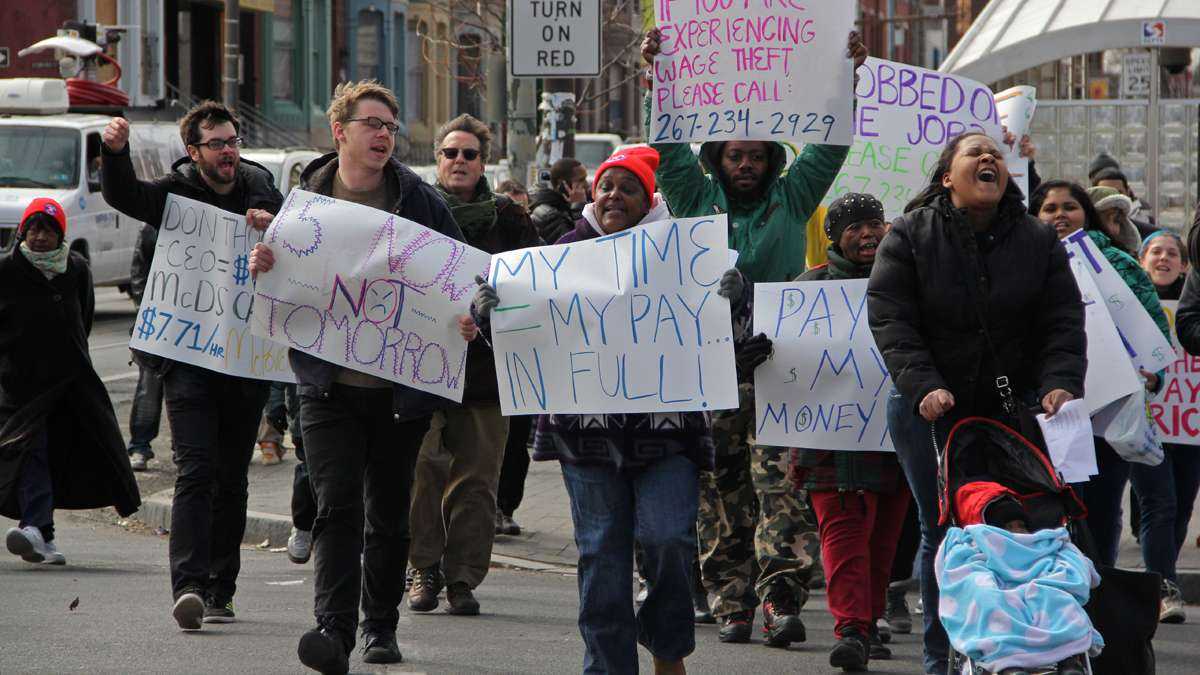Time for universal basic income in American cities?

Protesters rally for higher wages and a union for fast food workers during a protest in front of the Broad Street McDonald's at Girard Avenue in March 2014. (Emma Lee/WHYY)
“It’s hard to maintain a life on the money we’re receiving… We need more to survive.”
Olivia Bey-Smith, a worker at McDonald’s at Broad and Girard streets in Philadelphia shared these words before participating in a one-day strike in 2014 against unfair wages and attacks on collective bargaining.
Low wages weigh heavy on the minds and lives of America’s working poor as the debate over wage stagnation continues to enrapture pundits and policymakers alike. The emergence of the Service Employees International Union’s Fast Food Forward movement in late 2012 instigated a more formal conversation about increasing the minimum wage — one that was long overdue.
Since this effort began, Seattle, the states of New York and California, and other governments have successfully passed bills that will phase in a $15 minimum wage over the next several years.
Guaranteed security for all?
Some anti-poverty advocates, however, are beginning to ask a more radical question: What if the government instituted a Universal Basic Income program and simply mailed out a generous check every month as a right of citizenship? With a UBI in place, every American would receive an unconditional sum of money as a form of social security.
American welfare reform has been defined by increasing demands to demonstrate the need for public assistance and attaching such support, in cash and services, to one’s ability to maintain employment or prove one’s neediness. However, fueled by different visions, advocates on the right and the left are beginning to consider the limits of an American welfare tradition grounded in individual responsibility alone.
This next year will mark the beginning of two pilot UBI programs in the United States. The first will be sponsored by the private sector with Silicon Valley startup Y Combinator funding a study in Oakland. The second pilot program was secured just this past month when the District of Columbia city council passed its $15 minimum wage bill and included an amendment for the initiation of a UBI pilot program.
City Councilmember David Grosso who introduced the amendment emphasized that the UBI study would catalyze an important conversation regarding, he said, “what it takes to live in this city.” Grosso noted the frequency with which D.C. and other cities continually debate the minimum wage. “I think we should look at all the options and stop talking about things that are band-aid fixes,” he said.
Making the right choice for Philadelphia
Philadelphia, like cities throughout the U.S., has been engaged in its own efforts to increase the minimum wage. Led by Philadelphia’s 15Now campaign, local advocates hope the city will follow others in passing new wage laws. In a February opinion piece, Kia Hinton of Philadelphia organization Action United, and Shymara Jones, a Philadelphia Popeye’s worker and a member of the Fight for $15 National Organizing Committee, argued that “Raising the wage floor would strengthen neighborhoods across the city …. With current wages so low, too many families cannot afford their basic needs, which puts more strain on public-assistance programs and holds back our city.”
At the moment, interest in a guaranteed income among minimum wage advocates remains erratic. In fact, the relationship between minimum wage advocates and UBI advocates is oftentimes one of antagonism. Proponents of UBI argue that minimum wage battles treat a symptom rather than the cause of economic inequality. On the other hand, some argue that introducing a UBI might improve the collective bargaining ability of low-wage workers, creating an income floor which would incentivize employers to increase wages so that individuals would actually be willing to accept traditionally low-paid service sector jobs, for example.
It takes more than money to end poverty
Outside these possibilities, however, there are several important considerations before UBI, like minimum wage, should become a mainstream demand for labor movements like Philadelphia’s. The basic assumption underlying UBI is that giving people money will help end poverty.
“Progressives and libertarians alike are loath to admit that many of the poor and jobless are lacking more than just cash,” said Isabel Sawhill, a senior economic researcher at the Brookings Institution. “They may be addicted to drugs or alcohol, suffer from mental health issues, have criminal records, or have difficulty functioning in a complex society. Money may be needed but money by itself does not cure such ills.”
In evaluating whether to adopt a UBI platform, labor advocates should also take the current political climate seriously. Advocates of UBI on the right hope that such a program will bring an end to the welfare state. UBI as a means of dismantling welfare programs will only prove deeply unsettling. Many public assistance programs are often inefficient and bureaucratic, surely, but instead of turning our back on the role of government in maintaining a strong social safety net, labor advocates should push for policies like universal pre-kindergarten and paid family leave.
Lastly, while there exists mixed evidence that UBI would affect employment levels, UBI skeptics are right to worry about the dignity of work under a UBI program. The U.S. has failed to make serious investments in job training programs. Perhaps instead of a Universal Basic Income, we should be fighting for Universal Basic Work, where work offers a living wage as inflation changes as well as provides sense of purpose.
WHYY is your source for fact-based, in-depth journalism and information. As a nonprofit organization, we rely on financial support from readers like you. Please give today.

